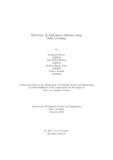Detection of alzheimer's disease using deep learning
Abstract
Machine Learning has been on top of its form over the last few years. It covers a vast
area of predictive web browsing, email and text classification, object detection, face
recognition etc. Among all of the other applications of machine learning, deep learning
has gained more popularity over the last several years. It is helping researchers
in the field of biomedical problems like detection of different types of diseases such
as Cancer, Alzheimer, Malaria, Blood cell detection etc. Deep learning is a subset of
machine learning algorithms that is used for classification, image processing etc. by
extracting features. In our research, we used Convolutional Neural Network (CNN)
for classi cation of Alzheimer patients and healthy patients from Magnetic Resonance
Imaging (MRI) data. The dataset (OASIS-1) contains 416 subjects classi ed
into non-demented and mild to moderate Alzheimer's disease. The classification of
this type of medical data is very significant for creating a prediction model or system
to examine the presence of the disease in different subjects or to estimate the phase
of the disease. Classification of Alzheimer's disease has always been difficult and selecting
the distinctive features is the most complicated part of it. By using different
CNN architectures like InceptionV3, Xception, MobileNetV2, VGG16, VGG19 we
have classified Alzheimer's patients from healthy subjects by calculating different
model accuracy, confusion matrix and ROC curve from their MRI data. Among all
the models, the basic CNN and the InceptionV3 provide the best accuracy up to
90.62%. This research shows us how different CNN architectures perform on our
MRI data of Alzheimer's subjects and healthy subjects in case of classification and
helps us to find the best models for the detection of Alzheimer's disease.

